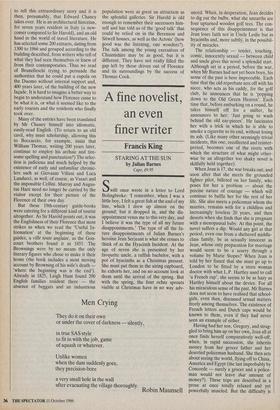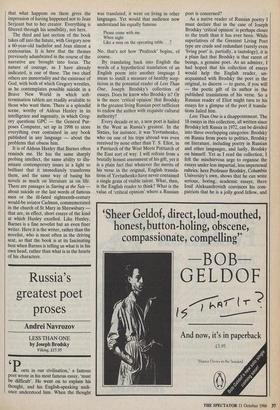A fine novelist, an even finer writer
Francis King
STARING AT THE SUN by Julian Barnes Cape, £9.95 Swift once wrote in a letter to Lord Bolingbroke: 'I remember, when I was a little boy, I felt a great fish at the end of my line, which I drew up almost on the ground; but it dropped in, and the dis- appointment vexes me to this very day, and I believe it was the type of all my future disappointments.' The type of all the fu- ture disappointments of Julian Barnes's heroine Jean Serjeant is what she comes to think of as the Hyacinth Incident. At the age of seven she is presented by her favqurite uncle, a raffish bachelor, with a pot of hyacinths as a Christmas present. She must put them in the airing cupboard, he exhorts her, and on no account look at them until the arrival of the spring. But with the spring, the four ochre sprouts visible at Christmas have in no way adv- anced. When, in desperation, Jean decides to dig out the bulbs, what she unearths are four upturned wooden golf tees. The con- sequence of this disappointment is that Jean loses faith not in Uncle Leslie but in hyacinths and, more subtly, in the possibil- ity of miracles.
The relationship — tender, touching, comic, innocently sexual — between child and uncle gives this novel a splendid start. Although set in a period, before the war, when Mr Barnes had not yet been born, his sense of the past is here impeccable. Each time that the old reprobate sets off with his niece, who acts as his caddy, for the golf club, he announces that he is 'popping down to the Old Green Heaven'. Each time that, before embarking on a round, he takes himself off for a snifter, he announces to her: 'Just going to wash behind the old ear-pieces'. He fascinates her with a trick in which he is able to smoke a cigarette to its end, without losing its ash. (Like many other seemingly trivial incidents, this one, recollected and reinter- preted, becomes one of the rivets with which the structure of what might other- wise be an altogether too shaky novel is skilfully held together).
When Jean is 17, the war breaks out; and soon after that she meets the grounded fighter pilot, billeted on her family, who poses for her a problem — about the precise nature of courage — which will continue to baffle her for the rest of her life. She also meets a policeman whom she marries, remains with for a childless and increasingly loveless 20 years, and then deserts when she finds that she is pregnant with a menopausal baby. At this point, the novel suffers a dip. Would any girl at that period, even one from a sheltered middle- class family, be as sexually innocent as Jean, whose only preparation for marriage would seem to be a scurry through a volume by Marie Stopes? When Jean is told by her fiancé that she must go up to London to be fitted by a stern woman doctor with what L.P. Hartley used to call `a French cap', she seems to be as hazy as Hartley himself about the device. For all his miraculous sense of the past, Mr Barnes does not seem to have realised that school- girls, even then, discussed sexual matters freely among themselves. The existence of French letters and Dutch 'caps would be known to them, even if they had never seen an example of either.
Having had her son, Gregory, and strug- gled to bring him up on her own, Jean all at once finds herself comparatively well-off, when, in rapid succession, she inherits money from her grocer father and her deserted policeman husband. She then sets about seeing the world, flying off to China, America and Egypt (the last improbably by Concorde — surely a grocer and a police- man would not leave that amount of money?). These trips are described in a prose at once totally relaxed and yet powerfully muscled. But the difficulty is that what happens on them gives the impression of having happened not to Jean Serjeant but to her creator. Everything is filtered through his sensibility, not hers.
The third and last section of the book takes off into the future, with Gregory now a 60-year-old bachelor and Jean almost a centenarian. It is here that the themes previously adumbrated in the course of the narrative are brought into focus. The nature of courage, as I have already indicated, is one of these. The two chief others are immortality and the existence of God, with both of which Gregory wrestles, as he contemplates possible suicide in a Brave New World in which soft- termination tablets are readily available to those who want them. There is a splendid scene, worthy of Aldous Huxley in its intelligence and ingenuity, in which Greg- ory questions GPC — the General Pur- poses Computer, set up in 1998 to store everything ever contained in any book published in any language — about the problems that obsess him.
It is of Aldous Huxley that Barnes often reminds me. He has the same sharply probing intellect, the same ability to illu- minate contemporary issues in a light so brilliant that it immediately transforms them, and the same way of basing his novels as much on literature as on life. There are passages in Staring at the Sun about suicide or the last words of famous men or the ill-fated eighteenth-century would-be aviator Cadman, commemorated in the church of St Mary in Shrewsbury that are, in effect, short essays of the kind at which Huxley excelled. Like Huxley, Barnes is a fine novelist but an even finer writer. Here it is the writer, rather than the novelist, who is most often in the driving seat, so that the book is at its fascinating best when Barnes is telling us what is in his own head, rather than what is in the hearts of his characters.



























































 Previous page
Previous page